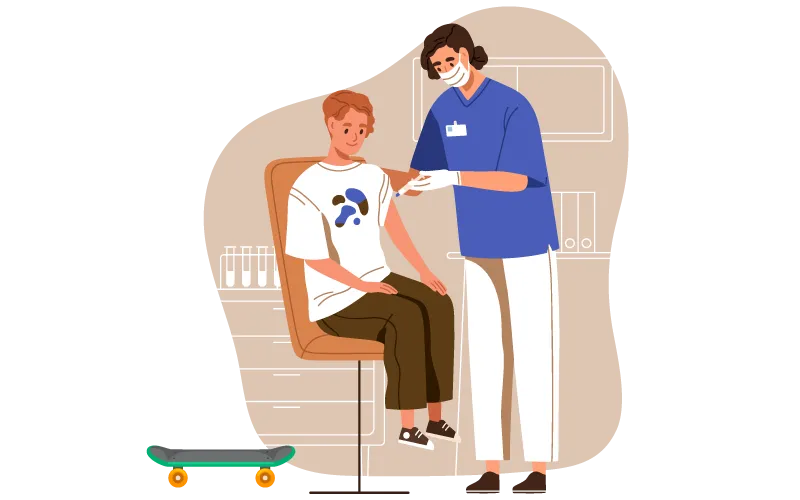Meningococcal disease
What is meningococcal disease?
Meningococcal disease is a serious bacterial infection caused by Neisseria meningitidis bacteria. This type of bacteria can cause severe illnesses such as meningitis (inflammation of the membranes surrounding the brain and spinal cord) and blood poisoning (septicaemia). Meningococcal disease can progress rapidly and may become life-threatening if not promptly treated.
In the EU/EEA, about 3000 cases are reported each year on average, although this number dropped during the pandemic. Of these, the disease is fatal in around 10% of cases.
At a glance: Meningococcal disease in Europe
- A serious bacterial infection that is a major cause of meningitis and blood poisoning
- Meningococcal bacteria spreads through the air
- Over 1500 cases and around 50 deaths every year
- Vaccination can prevent meningococcal disease and its complications

What are the symptoms of meningococcal disease?
The symptoms of meningococcal disease can vary, but they often include:
- fever
- severe headache
- stiff neck
- nausea and vomiting
- sensitivity to light
- confusion or altered mental state
- rash (a red or purple rash that does not fade when pressed)
- rapid breathing
- cold hands and feet
It is important to note that not all individuals with meningococcal disease will exhibit all of these symptoms.

What are the complications of meningococcal disease?
Meningococcal disease can lead to serious complications, including:
- brain damage
- hearing loss
- learning disabilities
- kidney failure
- septic shock
- death
How does the disease spread?
Meningococcal disease is spread through respiratory droplets from an infected person. These droplets can be released through activities like coughing, sneezing, or close personal contact. The bacteria can also live harmlessly in the throat and nose of some individuals, making them carriers who can potentially transmit the bacteria to others.
Who is at risk of meningococcal disease?
While anyone can contract meningococcal disease, certain groups are at higher risk, including:
- infants and young children
- adolescents and young adults
- people living in close quarters with someone who has the disease
- individuals with certain medical conditions that weaken the immune system
- travellers to areas with high rates of meningococcal disease

How can meningococcal disease be prevented?
In the EU, multiple vaccines are authorised for use to protect against some types (serogroups) of meningococcal bacteria. Vaccination is mainly recommended for infants and adolescents in the EU/EEA with different vaccination programmes in place. People of any age may be recommended to get vaccinated or receive a catchup vaccine. Specific vaccine recommendations may be implemented for people in certain high-risk groups.
How is meningococcal disease treated?
Meningococcal disease is a medical emergency, and immediate treatment is essential. Antibiotics are used to treat the infection. Prompt medical attention can significantly improve the chances of a positive outcome and reduce the risk of complications.
